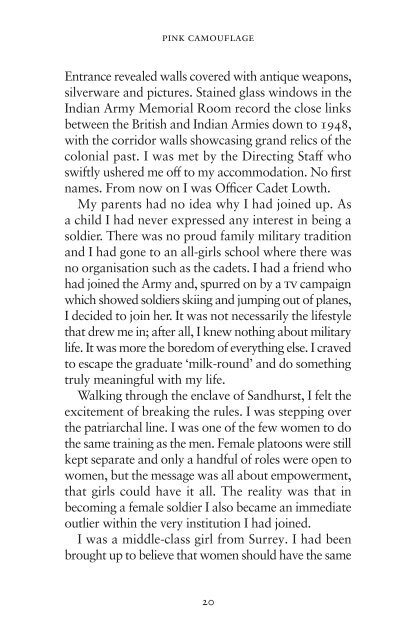Pink Camouflage by Gemma Morgan sampler
Her husband found her by the roadside, delirious and choking on her own vomit. Gemma Morgan was 33, happily married with two young children, an outstanding army service record and a first-class international sporting career. But underneath she was a wreck, surviving on a cocktail of vodka, Valium and sleeping pills. Misogyny, sexual abuse and toxic masculinity had been the daily realities of her Army career long before being deployed unarmed and unsupported to the blood and mayhem of a war zone. Motherhood left her lost and alienated, a soldier who had deliberately suppressed her femininity with no idea how to cope. Together, these experiences triggered a mental health crisis that left her suicidal, battling PTSD, betrayed and abandoned by the institution to which she had devoted seven years of her life. With the support of her family Gemma has since been on a long, hard and bumpy road to recovery. This is her story in her own words. She has told it to inspire others, especially those who have been affected by the toxic and coercive leadership culture that continues to pervade the British Army.
Her husband found her by the roadside, delirious and choking on her own vomit. Gemma Morgan was 33, happily married with two young children, an outstanding army service record and a first-class international sporting career. But underneath she was a wreck, surviving on a cocktail of vodka, Valium and sleeping pills.
Misogyny, sexual abuse and toxic masculinity had been the daily realities of her Army career long before being deployed unarmed and unsupported to the blood and mayhem of a war zone.
Motherhood left her lost and alienated, a soldier who had deliberately suppressed her femininity with no idea how to cope.
Together, these experiences triggered a mental health crisis that left her suicidal, battling PTSD, betrayed and abandoned by the institution to which she had devoted seven years of her life.
With the support of her family Gemma has since been on a long, hard and bumpy road to recovery. This is her story in her own words. She has told it to inspire others, especially those who have been affected by the toxic and coercive leadership culture that continues to pervade the British Army.
You also want an ePaper? Increase the reach of your titles
YUMPU automatically turns print PDFs into web optimized ePapers that Google loves.
<strong>Pink</strong> camouflage<br />
Entrance revealed walls covered with antique weapons,<br />
silverware and pictures. Stained glass windows in the<br />
Indian Army Memorial Room record the close links<br />
between the British and Indian Armies down to 1948,<br />
with the corridor walls showcasing grand relics of the<br />
colonial past. I was met <strong>by</strong> the Directing Staff who<br />
swiftly ushered me off to my accommodation. No first<br />
names. From now on I was Officer Cadet Lowth.<br />
My parents had no idea why I had joined up. As<br />
a child I had never expressed any interest in being a<br />
soldier. There was no proud family military tradition<br />
and I had gone to an all-girls school where there was<br />
no organisation such as the cadets. I had a friend who<br />
had joined the Army and, spurred on <strong>by</strong> a TV campaign<br />
which showed soldiers skiing and jumping out of planes,<br />
I decided to join her. It was not necessarily the lifestyle<br />
that drew me in; after all, I knew nothing about military<br />
life. It was more the boredom of everything else. I craved<br />
to escape the graduate ‘milk-round’ and do something<br />
truly meaningful with my life.<br />
Walking through the enclave of Sandhurst, I felt the<br />
excitement of breaking the rules. I was stepping over<br />
the patriarchal line. I was one of the few women to do<br />
the same training as the men. Female platoons were still<br />
kept separate and only a handful of roles were open to<br />
women, but the message was all about empowerment,<br />
that girls could have it all. The reality was that in<br />
becoming a female soldier I also became an immediate<br />
outlier within the very institution I had joined.<br />
I was a middle-class girl from Surrey. I had been<br />
brought up to believe that women should have the same<br />
20


















